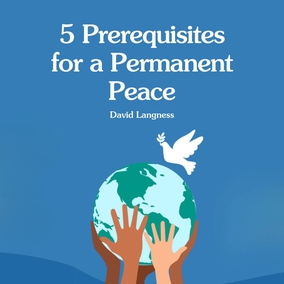The views expressed in our content reflect individual perspectives and do not represent the authoritative views of the Baha'i Faith.
A world at peace has long been the dream of humankind. The yearning for a planet not only without warfare and violence but also united as one family is universal.
Though realization of this dream is no easy task, the potential rewards of bringing people together are great. As always, the starting place is found within the individual.
As we focus on our own personal understandings of what it takes to create peace within ourselves, we begin to establish peace within our families. Family unity naturally spills over to become the building block of peace within our nations, which will eventually help create a peaceful world. To begin this process, we must examine any barriers that prevent unity. Two in particular are related to how we view strangers.
The First Barrier that Prevents Unity
We encounter the first barrier to unity when we consider the way we view the world in general. If we believe that the world is composed of individual nations and not of individual people, this creates a mentality that tends to perceive frontiers, clear lines along borders, and boundaries beyond which lie foreigners and aliens. In the Baha’i teachings, Baha’u’llah has provided a new perspective to overcome this: “The earth is but one country, and mankind its citizens.” – Gleanings from the Writings of Baha’u’llah, p. 250.
Before our initial reaches into space in the middle of the twentieth century, our view of the world was often consistent with the image of a classroom globe: a sphere composed of different-colored countries. That first photograph of the blue-green planet Earth taken from space helped change our view of the world. From space, Earth does not appear divided; there are no countries, no borders, no foreigners. Earth is the home and dwelling place of all people: “This span of earth is but one homeland and one habitation.” – Baha’u’llah, Tablets of Baha’u’llah, p. 167. Baha’u’llah also wrote:
He Who is your Lord, the All-Merciful, cherisheth in His heart the desire of beholding the entire human race as one soul and one body. – Baha’u’llah, Gleanings from the Writings of Baha’u’llah, p. 214.
In pursuit of this ultimate goal of world peace and unity, the Baha’i Faith asks us all to:
Be thou a summoner to love, and be thou kind to all the human race. Love thou the children of men and share in their sorrows. Be thou of those who foster peace. Offer thy friendship, be worthy of trust. Be thou a balm to every sore, be thou a medicine for every ill. Bind thou the souls together. – Abdu’l-Baha, Selections from the Writings of Abdu’l-Baha, p. 26.
The Second Barrier to Unity
We can find the second barrier to unity in the way we view others in general. We often see people not as unique individuals, but rather as representatives of a particular group. This barrier is harder to overcome because unity cannot be established between groups of people until it is achieved among individuals.
There is a reason for this barrier to unity. The way we group people—in very arbitrary and simplistic categories—means that race, nationality, and ethnicity are often tacitly defined by a particular set of traits, the presumed attributes of a group.
Coming up with a name for a group of people does not make the grouping real, and assigning someone to a group isn’t just a superficial appraisal of who that person is—it makes that person archetypal of the group. The individual becomes invisible to the extent that we see only the presumed attributes. This perspective forms the root of racial profiling—not just a problem among law enforcement professionals. It is the barrier of prejudice that all of us must work to overcome. Abdu’l-Baha, in this short verse, asks us to refrain from harming any other human being:
Unless ye must,
Bruise not the serpent in the dust,
How much less wound a man.
And if ye can,
No ant should ye alarm,
Much less a brother harm. – Ibid., p. 256.
Our views of others are based on deep-seated beliefs that we may rarely examine. They remain unchallenged and, admit it or not, we often assume that stereotypes are real—that “Jewishness,” “African-Americanness,” “Hispanicness,” and “Whiteness” are real. These become identities based upon our view of outward appearances, behaviors, and myths. They do not describe individual people, only the presumed distinction of groups, and everyday language usage tends to legitimatize them as meaningful expressions of identity. But they do not, in reality, define who we are, or who other people are.
















Comments
Sign in or create an account
Continue with Googleor